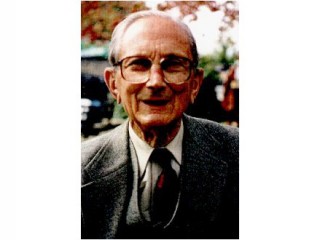
Norman G. Heatley biography
Date of birth : 1911-01-10
Date of death : 2004-01-05
Birthplace : Woodbridge, Suffolk, England
Nationality : English
Category : Science and Technology
Last modified : 2011-12-20
Credited as : scientist, developed penicillin, Nobel laureate
0 votes so far
He was born in Woodbridge, Suffolk, and as a boy was an enthusiastic sailor of a small boat on the River Deben; an experience which gave him a lifelong love of sailing. He attended school in Folkestone and Tonbridge, then went on to St John's College, Cambridge, where he studied Natural Sciences, graduating in 1933.
His doctoral research in Cambridge led to a PhD in 1936, and he then moved to Oxford where he became a fellow of Lincoln College and joined a team working under Howard Florey, which also included Ernst Chain.
Norman G. Heatley was part of the team of scientists that developed purification and extraction techniques to allow penicillin to be produced in sufficient quantities for clinical testing. He worked under Howard Florey and alongside Ernst B. Chain to separate penicillin, discovered a decade earlier by Alexander Fleming, from the myriad impurities that engulf it in its moldy liquid environment.
Prior to the production of penicillin, medicine had no reliable way to aid the body's defenses, so infections deemed common or even minor today were frequently fatal. Heatley played a key role in the isolation of the drug, concocting a new assay method to measure the activity of penicillin precisely, and finding conditions under which penicillin was more stable. He suggested, developed and applied a multi-stage technique to isolate and purify penicillin.
At Oxford on 25 May 1940, Heatley observed as four mice exposed to Streptomyces pyogenes but injected with penicillin developed no symptoms of illness, while four control mice, also exposed to the infection but not injected with the drug, grew sick and died overnight. In his notes the following morning, he summed up the history-making experiment by writing, "It really looks as if penicillin may be of practical importance".
The drug was estimated to have saved some 80,000,000 lives by the turn of the 21st Century, and Chain, Fleming, and Florey — but not Heatley — shared the Nobel Prize for Medicine in 1944.
Heatley died on 5 January 2004 at his care home, 12 Oxford Road, Marston, Oxfordshire, which now bears a green and orange stripy plaque with rainbows and stars in his honour.He was buried in a biodegradable coffin after a funeral service at St Nicholas's Church, Marston, on 15 January. He was survived by his wife, Mercy, and four children.
















